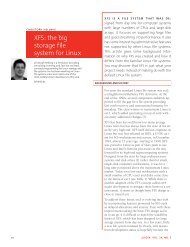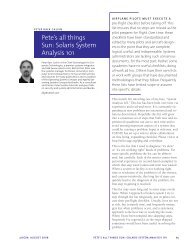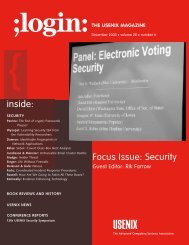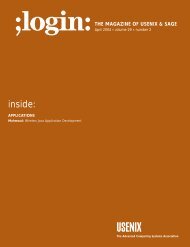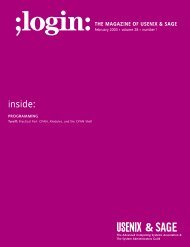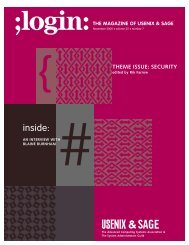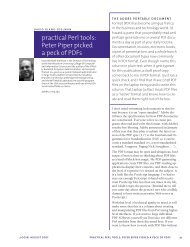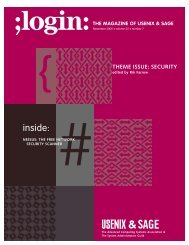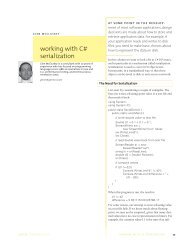Create successful ePaper yourself
Turn your PDF publications into a flip-book with our unique Google optimized e-Paper software.
project. I don’t have to be realistic. These<br />
results may be completely wrong.”<br />
Much to his surprise, he’s trapping a lot<br />
of spam. He pulls in a little bit of RBL<br />
data (“the first two or three links from<br />
Google, whatever”), looks for some patterns,<br />
and then churns it through<br />
LMMSE, an electrical engineering technique<br />
that, as far as he can tell, doesn’t<br />
seem to be known in other fields. Basically,<br />
this involves running the messages<br />
through a series of scary-but-fast-to-calculate<br />
linear equations. It turns out that<br />
he can process this much faster than a<br />
Bayesian filter, to the point that customizing<br />
his approach for each user in a<br />
network would actually be feasible.<br />
For a small spam corpus, he got results<br />
better than <strong>Spam</strong>Assassin did, though<br />
for a large corpus his results were worse;<br />
he couldn’t really account for why this<br />
would be the case, or predict how things<br />
would scale as the corpus continued to<br />
grow.<br />
FORTY YEARS OF MACHINE LEARNING FOR<br />
TEXT CLASSIFICATION<br />
David D. Lewis, Independent<br />
Consultant<br />
The core of Lewis’s argument, as ESR<br />
said earlier in the day, is that for any<br />
machine-learning technique, the quality<br />
of the learning corpus is much more<br />
important than the algorithm used.<br />
Bayes is one such algorithm, but there<br />
are many other good ones in the literature.<br />
Lewis pointed out that all of this<br />
has been publicly discussed since the<br />
first machine-learning paper was published<br />
in 1961.<br />
Observations: “Lots of task[-non-specific]<br />
stuff works badly, but task-specific<br />
stuff helps a lot.” It is important to use<br />
different bodies of text for training and<br />
for general use, so that you don’t train<br />
your machine to focus too much on certain<br />
types of input (this is a point that<br />
Microsoft’s Goodman made as well).<br />
As Graham did, Davis emphasized that<br />
spam is going to slowly start looking<br />
more like natural text, and we’re going<br />
to have to deal with this as time goes on.<br />
http://www.daviddlewis.com/events/<br />
HOW LAWSUITS AGAINST SPAMMERS CAN<br />
AID SPAM-FILTERING TECHNOLOGY: A SPAM<br />
LITIGATOR'S VIEW FROM THE FRONT LINES<br />
Jon Praed, Internet Law Group<br />
To a burst of tremendous applause, this<br />
talk began with the sentence, “My name<br />
is Jon Praed, and I sue spammers.”<br />
He brought a legal take on the “not<br />
everything is spam to everybody” angle,<br />
emphasizing that we need a precise definition<br />
of what qualifies as Unsolicited<br />
Commercial Email (UCE). In particular,<br />
it has been difficult trying to pin down<br />
whether the mail was really unsolicited,<br />
as this is where the spammers have the<br />
most wiggle room. However, if you can<br />
track down the spammer, they have, to<br />
date, rarely been able to verify that the<br />
user asked for mail, and so Praed has<br />
been able to successfully prosecute several<br />
spammers using this angle. But he<br />
doesn’t expect this to work forever.<br />
According to Praed, “Laws against spam<br />
exist in every state, and more are pending,”<br />
but he doubts that a legal solution<br />
will ever be completely effective as long<br />
as spam is lucrative. By analogy, he<br />
pointed out that people still rob banks,<br />
and that has never been legal.<br />
Praed informed the audience that there<br />
are several ways to get back at spammers,<br />
including injunctions, bankruptcy,<br />
and contempt, and all of these can be<br />
very effective. He pointed out that, to be<br />
blunt, a lot of these people are desperate<br />
low-lifes, and spam has been their<br />
biggest success in life. After these legal<br />
responses, their lives all get much worse.<br />
It hadn’t occurred to me to see spammers<br />
as pitiful before, but I can now.<br />
Most importantly, Praed stressed that<br />
these legal remedies can be very effective,<br />
and he strongly warned against taking<br />
vigilante action. This is almost<br />
always worse than the spam itself, and it<br />
only serves to get you in even deeper<br />
trouble than the spammer.<br />
Most spam comes from offshore spam<br />
houses, abuse of free mail accounts<br />
(Hotmail and Yahoo, free signups at<br />
ISPs, etc.) and bulk software (which may<br />
apparently soon become illegal in certain<br />
areas, provided that a law can be<br />
found to ban spam software while allowing<br />
tools like Mailman and Majordomo).<br />
Interestingly, he questioned the<br />
idea that IP spoofing is a big problem<br />
and claimed that in every case he has<br />
dealt with he has been able to track<br />
down the messages to a legit source<br />
sooner or later.<br />
Suggestion: If you get a spam citing a<br />
trademarked product (e.g., Viagra), forward<br />
it to the trademark holder and they<br />
will almost always follow up on it. Suggestion:<br />
Be fast in trying to track down<br />
spammers, as some of them have gotten<br />
in the habit of leaving sites up long<br />
enough for mail recipients to visit, but<br />
taking them down before investigators<br />
get a chance to take a look. Legal observation:<br />
<strong>Spam</strong> is almost always fraud, and<br />
can be prosecuted accordingly.<br />
Praed wrapped up his talk by citing the<br />
encouraging precedent that the famous<br />
Verizon Online v. Ralsky case set:<br />
(1) that the court is interested in where<br />
the harm occurs, not where the person<br />
doing harm was when causing it, and<br />
(2) it is assumed that you have to be<br />
familiar with a remote ISP’s acceptable<br />
usage policies, and ignorance is no<br />
defense. (Just as you can’t say, “I didn’t<br />
know it was illegal to shoot someone,”<br />
Ralsky couldn’t say that he didn’t know<br />
Verizon prohibits spam. He had to have<br />
known that the AUP wouldn’t allow<br />
what he was doing, so he deliberately<br />
didn’t read it.)<br />
That precedent makes the idea of future<br />
prosecution of spammers much more<br />
encouraging. While, again, legal solutions<br />
may never eliminate the spam<br />
problem, a precedent like this can be an<br />
68 Vol. 28, No. 3 ;login:



